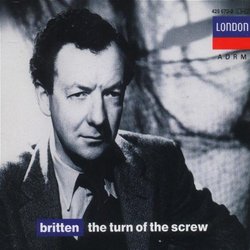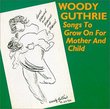| All Artists: Benjamin Britten, Joan Cross, Olive Dyer, David Hemmings, Arda Mandikian, Peter Pears, Jennifer Vyvyan Title: Britten: The Turn Of The Screw / Britten, Pears, Vyvyan, Cross, et al Members Wishing: 0 Total Copies: 0 Label: Decca Import Release Date: 2/7/1990 Album Type: Original recording reissued, Import Genre: Classical Styles: Opera & Classical Vocal, Historical Periods, Modern, 20th, & 21st Century Number of Discs: 2 SwapaCD Credits: 2 UPC: 028942567221 |
Search - Benjamin Britten, Joan Cross, Olive Dyer :: Britten: The Turn Of The Screw / Britten, Pears, Vyvyan, Cross, et al
 | Benjamin Britten, Joan Cross, Olive Dyer Britten: The Turn Of The Screw / Britten, Pears, Vyvyan, Cross, et al Genre: Classical
|
Larger Image |
CD DetailsSimilar CDsSimilarly Requested CDs
|
CD ReviewsMemorable Melancholy Christopher Schmitz | Rocky River, Ohio United States | 04/01/2003 (5 out of 5 stars) "The original version of Turn of the Screw, featuring the fluid tenor of the composer's lover Peter Pears, is still the stand-out. Based on a Henry James novella, this ghost story probes a very current theme (one found in the film L.I.E. or the Catholic priest sex scandals): man-boy seduction. Pears' character Quint (a musical pun on its use of fifths), the libretto implies with typical British indirection, had sex with the boy Miles. Even from beyond the grave, he continues his seduction with the honeyed words of librettist Piper and some haunting mellifluous melody by Britten. Miles' sister Flora is suffering a parallel seduction by salacious nanny Miss Jessel, which is less compelling, perhaps because it's less dear to James' or Britten's "haunted hearts."The children's governess, a prudish Pollyanna, is horrified as Miles and Flora begin to seem autistic, listening to other voices only they can hear. Miles utters blasphemies as church bells ring, a sign of his influence under a pagan and pederastic seducer. The showdown comes at the end when Miles dies inexplicably. Morgan of James' short story "The Pupil" dies in this way too; for Henry James, then, the tension of oncoming pedophiliac consummation is mysteriously fatal.Tension and mystery pervade Britten's score, but so does the detached melancholy of the inevitable. Britten whisks us through a kaleidoscope of emotions in this atmospheric chamber opera--The governess' nervous anticipation before meeting the children, her excitement upon meeting them, her numbing fear that all is not right at the manor house Bly. The boisterous group recitation of Miles' Latin lessons transforms into the boy's solo lament "Malo."Britten's melodies all over this opera are as catchy as pop song hooks. It is the best contribution England has made to a largely Italian art form. Its tension, horror, and otherworldliness are strangely addictive. The way Britten uses strings to mimic a horse-drawn carriage or piano to darken Mozart under Miles' fingers is brilliant. This is a brooding masterpiece that rewards muliple listening." A great opera gains by taking on a taboo subject Santa Fe Listener | Santa Fe, NM USA | 06/04/2006 (5 out of 5 stars) "I wanted to say something about sex in The Turn of the Screw, but first I should give a succinct review. This 1954 mono recording, featuring the same singers who premiered the work, has always been considered exemplary. Most critics believed it would never be equalled, and the performances from Jennifer Vyvyan as the Governness, Peter Pears as Quint, and David Hemmings as Miles probably haven't been bettered over the past fifty years.
But a recent recording on Virgin is superior to Britten's classic account in three ways. First, we get state-of-the-art digital sound that allows us to hear much more of Britten's exquisitely orchestrated score. Second, Daniel Harding's conducting is edgier and more gripping than Britten's, excellent as he was. Third, the singers are tenser, more psychologically attuned to the plot's homosexual overtones, than the composer ever allowed his singers to be--Britten kept the drama well inside the bounds of a Victorian ghost story. So, is the new version justified in making us think of sexual repression and abuse rather than simple scary ghosts? James's novella was a boring staple of high school English class when I was a junior, and yet I imagine it would have been snatched from the classroom if anyone had intimated that it secretly concerned pedophilia. All we talked about was whether the ghosts were real or a figment of somebody's imagination. The reviewer below takes it for granted that "of course" Quint was a pedophile who sexually corrupted (to use the Victorian term--we would say sexually abused) the boy Miles. Thus the story--and Britten's opera--unfolds through the governess's eyes as she gradually uncovers the sexual crimes of the household, and her mounting horror is justified, not by ghosts haunting the two children, but by knowledge of what Quint did while alive. In James's case, I think there is room for more ambiguity, the sexual implications being directed strongly to the governess more than the children; the effectiveness of the tale lies in its sexual ambiguity. Is a frigid spinster being frightened by her own libido? But Britten was without a doubt a repressed pedophile (someone more politely termed him an "intellectual pedophile," which doesn't even make sense). Since Quint appears on stage as a singer who is just as real as any ohter character, his cry of "you belong to me" at the end, just as Miles dies, gains by not being ambiguous. A real male is seducing a boy in front of our eyes, and by bringing that out, a staged production can be much more frightening than James's tale. " |

 Track Listings (9) - Disc #1
Track Listings (9) - Disc #1



![Seussical [2000 Original Broadway Cast]](https://nationalbookswap.com/cd//m/02/4802/514802.jpg)




